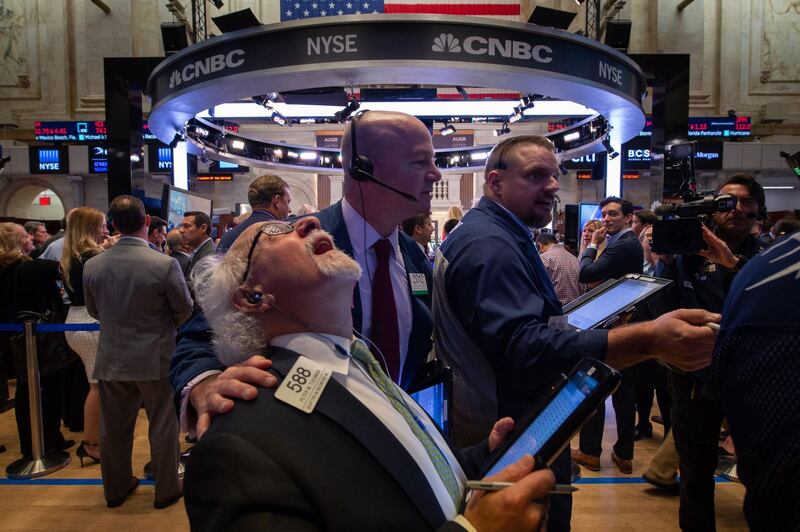There was little respite for equity investors on Thursday as the biggest US stock selloff in months rolled through Asia and Europe and futures pointed to another drop at the New York open. Core European bonds gained and Treasuries turned lower.
The worst of the stock declines were in Asia, where China’s Shanghai Composite gauge closed down more than 5 per cent. Taiwan’s technology-heavy TWSE Index plummeted more than 6 per cent in the region’s worst performance. By comparison, European losses were more contained, with the Stoxx Europe 600 Index and Britain’s FTSE 100 both slipping no more than 2 per cent. Italian equities headed for a bear market, however, and LeasePlan Group NV pulled a planned IPO.
Contracts across all three of the S&P 500, Dow Jones and Nasdaq indexes extended losses from Wednesday, after the latter gauge plunged more than 4 per cent for its worst day in seven years. Treasuries, which helped trigger the stock selloff when 10-year yields hit the highest since 2011, mostly fluctuated in a narrow range after jumping on Wednesday.
Investors seeking to pinpoint the cause of the current rout in equities have no shortage of culprits: US companies are increasingly fretting the impact of the burgeoning trade war, while the same issue prompted the IMF to dial down global growth expectations. In the tech sector, which was a key driver of the rally that pushed American equities to a record just a month ago, expensive-looking companies have been roiled by a hacking scandal.
___________
Read more:
US dollar and gold: bulls to take on the bears in Q4
Expect volatility as Opec challenges shale on the supply front
Two dominant factors to influence oil markets this year
___________
Against this backdrop, the Federal Reserve has been trimming its balance sheet and raising interest rates, provoking the ire of an unpredictable President Donald Trump and helping force a repricing of riskier assets. Mr Trump, who has claimed credit for record US stock levels, said after the market closed on Wednesday that the Fed is making a “mistake” and “has gone crazy”.
Mr Trump also said the stocks decline was “a correction that we’ve been waiting for for a long time”, after being briefed on the market turmoil. Treasury Secretary Steve Mnuchin said he’s not surprised the market is having “somewhat of a correction”.
“What you’re seeing right now is a bit of a panic - we wouldn’t say this looks like the end of the cycle,” said William Hobbs, head of investment strategy at Barclays Investment Solutions in London. “You’ve got to try to keep the skin in the game for as long as possible because it’s an incredibly profitable period of the cycle to be invested through if you can keep your nerve.”
An index of equity volatility in Europe jumped to the highest in more than four months after Wall Street’s “fear gauge”, as the Cboe Volatility Index, or VIX, is known, soared the most since February.
Wider market contagion appeared contained. In currencies, the euro and pound gained while the dollar weakened versus most of its major counterparts. The Swedish krona was the standout gainer, jumping after inflation data. The lira and rand rallied, but emerging currencies overall were little changed.
In fixed income, Italian bonds remained under pressure as Deputy Premier Matteo Salvini once again said the populist government will stick with its budget plan, though the country successfully sold new debt. Bunds and gilts led advances amid the broader risk-off mood.
Elsewhere, West Texas Intermediate crude slumped back to around $72 (Dh264) a barrel amid a broad decline in commodities. Precious metals bucked the trend, and gold jumped. A Bloomberg index of cryptocurrencies dropped as much as 11 per cent.






